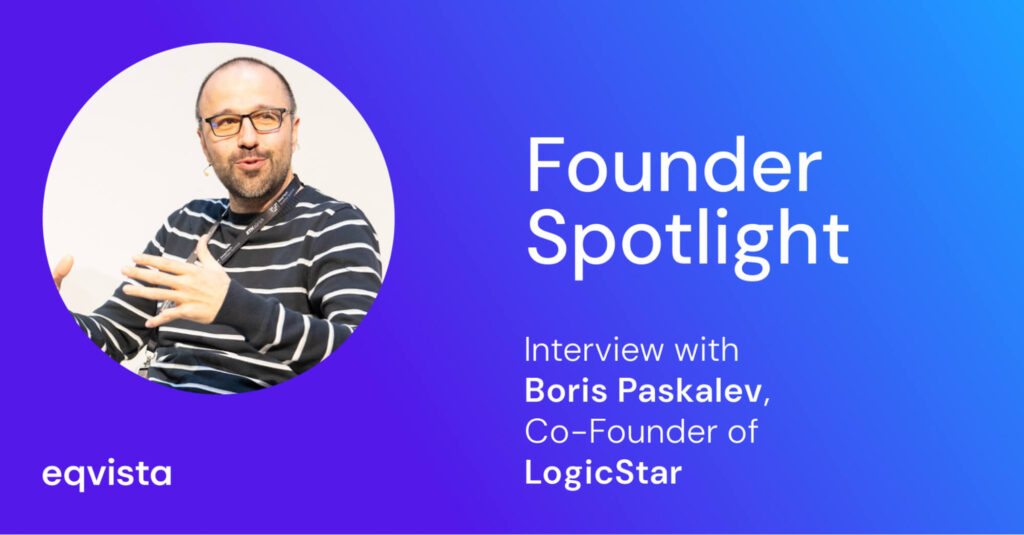Interview With Boris Paskalev, Co-Founder Logicstar
Welcome to another edition of Founder Spotlight with Boris Paskalev, the co-founder and CEO of LogicStar AI, a Swiss deep-tech startup focused on building agentic AI for autonomous application maintenance. Agentic AI is rapidly scaling, with expectations of transformative impact across business operations, decision-making, and automation in the coming decade. In the United States, the enterprise agentic AI market was valued at USD 769.5 million in 2024 and is expected to grow to USD 1.07 billion in 2025, with a CAGR of 43.6% through 2030.
Boris’ vision is to unlock innovation by automating the most expensive and time-consuming aspects of software maintenance, enabling reliable applications, and allowing engineers to focus on creative work. Boris and LogicStar AI have received industry attention, including winning an AI pitch competition at the START Summit in Switzerland. The company recently raised €2.9 million in pre-seed funding, led by Northzone, to further develop their agentic AI platform.

Hi, how has your background in computer science from MIT influenced your entrepreneurial journey?
MIT taught me that hard work unlocks extraordinary possibilities. It also instilled humility to recognize that the “smartest person in the room” changes depending on the problem—so choosing the right team and environment is everything. That mindset has guided my journey, where I’ve had the privilege of collaborating with brilliant minds from ETH Zurich, INSAIT, TRIUM, and more to push boundaries and build things we’re proud of.
What inspired you to co-found LogicStar.ai, and how do you envision the company transforming the software maintenance landscape?
LogicStar.ai is the natural evolution of what we started at DeepCode.ai. Back then, we relied on classical machine learning to detect issues in applications—learning from millions of open-source code fixes to power what is now Snyk Code. But in 2023, with the rise of large language models, the technology finally caught up to our original vision: combining deep semantic code reasoning with the generative capabilities of LLMs to deliver fully autonomous, hallucination-free maintenance. That’s exactly what the LogicStar AI agent does today—operating like a seasoned engineer, but faster and self-directed.
Why did LogicStar choose a model-agnostic approach to building AI agents, and how does this give you a competitive edge?
We initially explored building our own code model—our co-founders even contributed to BgGPT. But we realized models are rapidly commoditizing. Instead of competing in that arms race, we focused on the orchestration layer—picking the right model for the task, optimizing performance and cost, and delivering real, verifiable results to users. That flexibility is a key part of our edge.
How does LogicStar ensure its AI agents remain up-to-date with evolving coding standards?
We work with enterprise-grade applications maintained by expert engineers, giving us well-defined baselines and guardrails. On top of that, we continuously evaluate the latest models to match each task, ensuring our agents are always aligned with evolving standards and tech trends.

What do you see as the biggest challenges in the autonomous application maintenance space, and how is LogicStar positioned to address them?
The biggest challenge is hallucination—when AI-generated suggestions look plausible but are wrong for the specific application context. This forces engineers to waste time reviewing and debugging poor output. LogicStar is built to eliminate that friction by combining static and dynamic analysis with LLM reasoning—so engineers get reliable, production-ready fixes, not guesses.
How do you see AI evolving in software maintenance over the next five years? What role will LogicStar play in this evolution?
Over the next five years, AI for code will evolve beyond larger models—it’ll be about smart orchestration layers, domain-specific optimization, and context-aware reasoning. Costs will drop, specialization will increase. LogicStar is positioned to ride that curve: we identify which 80% of code changes are correct, choose the best model per task, and integrate seamlessly into engineering workflows. That’s where real value gets delivered.
How does LogicStar.ai handle potential vulnerabilities in AI-generated code? How does LogicStar.ai’s AI agent detect and respond to high-priority security incidents?
LogicStar doesn’t compete with tools like Snyk Code or observability platforms on detection. Instead, we solve the bigger bottleneck: follow-through. Most teams lack the time to act on all alerts. LogicStar autonomously triages, reproduces, and fixes issues—before customers even notice. It’s like having a senior engineer proactively cleaning up your backlog.
Congratulations on securing $3 million in pre-seed funding, how do you plan to allocate this funding?
We’ve already assembled our core team of experts. This round is focused on accelerating product development, expanding our agent capabilities, and running customer pilots. We’re investing heavily in feedback loops, especially with early partners using Python-based applications, and laying the groundwork for scale with a roadmap shaped by real user needs.
How does LogicStar.ai’s cap table strategy support its goal of maintaining a competitive edge in the evolving AI landscape?
We’re building a healthy, long-term cap table. That means bringing in strategic investors who offer more than capital—like domain expertise, technical insight, and access to markets. We’re also preserving strong equity incentives for our team, because retaining world-class AI talent is mission-critical. A clean, founder- and team-aligned cap table gives us the flexibility to grow responsibly.
How do you balance the potential for high valuations with the need to manage investor expectations in the rapidly evolving AI and software industry?
AI is moving fast, and so are valuations—but we’re staying grounded. We’ve seen inflated rounds followed by quiet collapses. Our approach is to focus on real traction and measurable value. That keeps investor expectations realistic and supports sustainable growth. We’re transparent about the challenges, and we prioritize defensibility over hype. It’s about long-term trust, not short-term noise.
If you could give one piece of advice to aspiring tech entrepreneurs, what would it be?
We’re on the brink of a once-in-a-generation technological revolution. If you have the entrepreneurial itch, now is the time to lean in. Follow your curiosity, take risks, and help shape the future we’ll all live in.
